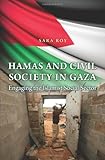Hamas and civil society in Gaza engaging the islamist social sector
Material type: TextSeries: Princeton studies in Muslim politicsPublication details: Princeton Princeton University Press 2011Description: xvii,319pISBN:
TextSeries: Princeton studies in Muslim politicsPublication details: Princeton Princeton University Press 2011Description: xvii,319pISBN: - 9780691124483
- 324.2569509531 22 RO-H
- HV6433.P25 R69 2011
- HIS026000 | POL034000
 Print
Print
| Item type | Home library | Collection | Shelving location | Call number | Materials specified | Status | Date due | Barcode | |
|---|---|---|---|---|---|---|---|---|---|
 Print
Print
|
OPJGU Sonepat- Campus | General Books | Main Library | 324.2569509531 RO-H (Browse shelf(Opens below)) | Available | 118589 |
Browsing OPJGU Sonepat- Campus shelves, Collection: General Books Close shelf browser (Hides shelf browser)
Includes bibliographical references and index.
"Many in the United States and Israel believe that Hamas is nothing but a terrorist organization, and that its social sector serves merely to recruit new supporters for its violent agenda. Based on Sara Roy's extensive fieldwork in the Gaza Strip and West Bank during the critical period of the Oslo peace process, Hamas and Civil Society in Gaza shows how the social service activities sponsored by the Islamist group emphasized not political violence but rather community development and civic restoration. Roy demonstrates how Islamic social institutions in Gaza and the West Bank advocated a moderate approach to change that valued order and stability, not disorder and instability; were less dogmatically Islamic than is often assumed; and served people who had a range of political outlooks and no history of acting collectively in support of radical Islam. These institutions attempted to create civic communities, not religious congregations. They reflected a deep commitment to stimulate a social, cultural, and moral renewal of the Muslim community, one couched not only--or even primarily--in religious terms.Vividly illustrating Hamas's unrecognized potential for moderation, accommodation, and change, Hamas and Civil Society in Gaza also traces critical developments in Hamas's social and political sectors through the Second Intifada to today, and offers an assessment of the current, more adverse situation in the occupied territories. The Oslo period held great promise that has since been squandered. This book argues for more enlightened policies by the United States and Israel, ones that reflect Hamas's proven record of nonviolent community building"--
"Unlike other books on Hamas this study examines Hamas's social service sector with a focus on the Oslo period. It analyzes the nature of Islamist social sector activities, the successes and failures of Islamist social activism and mobilization and argues that the ethos of civic engagement that defined Hamas's social sector acted as a viable and powerful alternative to militancy and political violence"--
There are no comments on this title.








